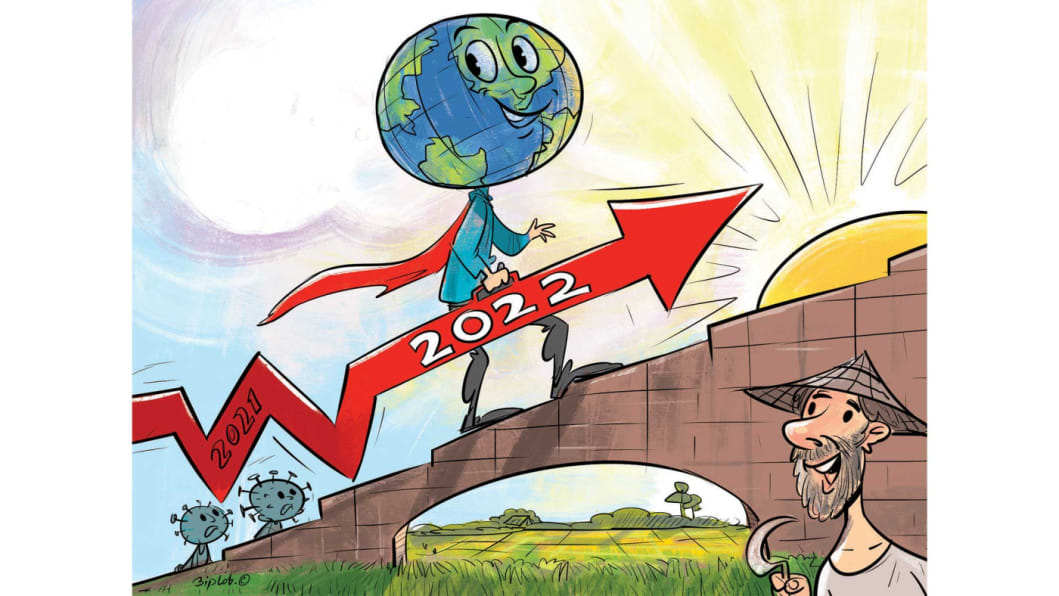My reflections and hopes for the new year

I cannot say for sure what 2022 will bring for every person on this planet, but for me it signifies a bend in the road. Last year is gone, and I can only hope that the new one will bring for us all exciting experiences, fewer worries, new opportunities, and more fulfilment.
At the end of each year, I usually write a column appropriate for the occasion. I not only feel the thrill that the last month of the year, particularly the last few days of December, brings to a writer, but also consider it my humble responsibility and honour to share with my readers my dreams, my frustrations, or my aspirations as the new year rolls around. After all, a new year is supposed to herald a new beginning, invoke a sense of joy, and give us hope for the future.
I can remember how I welcomed the First Night since I reached adulthood. In 1977, the year I first came to the USA, we teamed up with some of my Bangladeshi fellow students at Boston University and walked on a cold night from our campus to downtown. I still have photographs from 1978 New Year's Eve, when we got together with some couples from the Indian sub-continent and had a blast in a graduate student's apartment. And, as far as I can remember, our New Year's celebrations at Dhaka were some of the best.
I cannot say I feel all this sense of anticipation nowadays. The last two years have been a roller-coaster ride for humanity with Covid-19, economic uncertainty, lockdowns, and the after-effects of the pandemic. It was not like this ever, as far as I can remember.
Through this column, I would like to extend my best wishes for a happy new year to the readers of The Daily Star. I hope that 2022 is a peaceful, prosperous and stimulating year for you. I will also touch upon three areas here: the lessons learnt from the past, where we can go in the future, and the prospects for the global community in the coming days.
They say hindsight is 20/20, and while I do not agree with this aphorism, it seems we have seen some good years in the decade of the 2010s. But how could we have anticipated Covid-19 at the beginning of 2020? Who could have foreseen that the pandemic triggered by this deadly disease would still be with us after two years and still causing so much disruption and complications?
For me, some of the most lasting recollections from 2021 are the continuous rise in the cost of living, the loss of family and friends, shortened or cancelled travel plans, and the fear instilled by Delta and then Omicron variants. Fortunately, we started getting vaccinated, and now some countries have started on the "fourth jab".
But what about the rest of the world? A group of World Health Organization experts is calling for 70 percent of the global population to be fully vaccinated by mid-2022. As I write this column, vaccines are still in short supply in Africa and healthcare facilities in most developing countries are stretched to the limit. Howsoever we define the term "vaccinated", the overwhelming majority of the population in many countries remain unvaccinated. A map informed by data, compiled from government sources by the Our World in Data project at the University of Oxford, shows that countries in vast swaths of Africa and the Middle East have more than 90 percent of the citizens without any vaccination.
So, another year has gone by. Countless people around the globe felt a sense of loss, either because of Covid-related deaths or other setbacks. Rabindranath Tagore, I recall, wrote a song many years ago that captures the mood of our times—the emptiness and the overwhelming sense of vacuum. He wrote: "Kokhon jey boshonto gelo, ebar holo na gaan." (When did spring end? Didn't even hear any music.) In our case, 2020 and 2021 were two long years when spring came and we did not celebrate. We did not sing and all the festivities we had planned did not happen.
Now in 2022, we all are wondering what the new year will bring. Last year was a tragic one for many. After the vaccines became available towards the end of 2020, many of us had hoped that the pandemic would be over and we'd be able to go about our daily business as before. We'd travel, meet our family and friends more often, take our children and grandchildren to birthday parties and other social gatherings, go out and eat in a restaurant, and do away with many other activities that the multitude of restrictions—social distancing, masking, and fear and uncertainty—had imposed on us.
That did not happen. But many other changes took place to deal with the ongoing ravages of Covid-19. More people are working from home, online shopping boomed, and social exchanges are mostly "virtual". Last year was memorable in other ways. Bangladesh celebrated its 50th birthday, and Dhaka University turned 100. World events were plentiful, starting with mass vaccinations in some countries, the collapse of the US presence in Afghanistan, violence and bloodshed in Myanmar and Ethiopia, the failure of COP26 to deliver, and so on and so forth.
My hope for this year is that the warring factions particularly in Myanmar, Ukraine, Yemen, and Ethiopia will come to an agreement. The hungry and innocent will not suffer and nobody will die of hunger or drown while seeking a better life. The gains from economic growth and vaccinations will be shared equitably.
At the end of each year, my favourite magazine, The New Yorker, publishes a section named "Remembrances and Postscripts". I will not burden my readers with my own version of recollections from the best and worst moments of the last year, but I can't resist the temptation to share with you a glimpse into my world, tinged with sadness, as I ring out 2021.
At this juncture, all indications point to a burgeoning year for the world's economy. Inflation and supply chain hiccups will ease, and all other indicators point to a good but bumpy year. One of the curses of the pandemic economy is the volatility in major markets. Carbon emissions are down, and while it is a common practice to blame climate changes for all weather-related mishaps, we know that things were getting better.
Finally, a word to cheer you up. I will quote therapist Monique Bellefleur, who said in The Boston Globe ("The 2022 Mind-Set"): Be gentle with yourself. Beating yourself up for not functioning at your highest level or for not having your dream body will only make you feel bad. When we feel bad, we tend to turn to our most unhealthy coping mechanisms, which ultimately distance us even further from our personal goals. Try self-compassion and consideration of our current world context instead. Of course, you're tired, unmotivated, sad, etc.—we are in the third year of a global pandemic and that cannot be discounted.
Dr. Abdullah Shibli is an economist and serves as Senior Research Fellow at the US-based International Sustainable Development Institute (ISDI). His new memoir, "A Fairy Tale: Autobiographical Stories", was recently published by Jonantik.

 For all latest news, follow The Daily Star's Google News channel.
For all latest news, follow The Daily Star's Google News channel. 



Comments